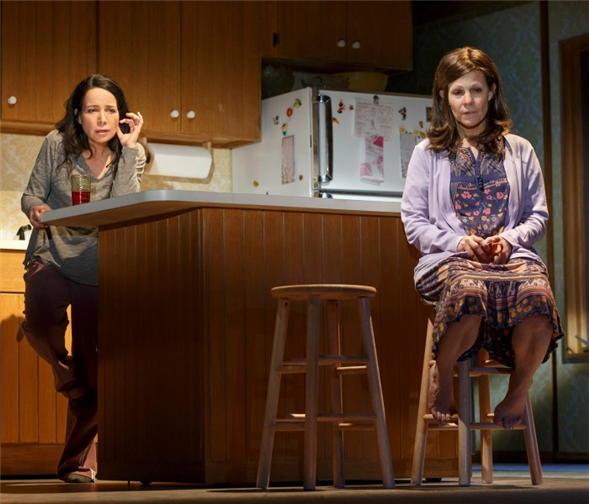Translate Page

Roundabout's revival of Marvin's Room explores timeless topics
---
Scott McPherson's 1990 play Marvin's Room, now enjoying its Broadway premiere courtesy of Roundabout Theatre Company, can turn on a dime -- not in its plot, but in its sensibility and emotions. Just take the first scene of this darkly comic tale of family dysfunction and health crises: Bessie (played by Lili Taylor) is faced with a new doctor who seems not entirely familiar with his tasks. As he babbles on about a nonexistent office insect problem, he's supposed to be drawing her blood to rule out certain diseases, yet he can't recall the word "tourniquet."
"I think we really approached the absurdity with a great sense of reality," says Anne Kauffman, a veteran Off-Broadway director who's making her Main Stem debut with Marvin's Room. "I think something Scott was doing with the absurdist humor was reflecting a journey, going down a rabbit hole of our medical infrastructure in this country. I feel like there is a rhythm that Scott created. There's a bit of a machine that he's built that is just exquisite, that you sort of give into a little bit."
In a program note written for the 1990 Hartford Stage production of Marvin's Room, McPherson talked about illnesses in his family, as well as the fact that both he and his partner were HIV positive. (They both passed away in 1992 shortly after the play's New York premiere at Playwrights Horizons, four years before it was turned into a movie with Meryl Streep.) But McPherson also noted that he wasn't writing directly about AIDS. Instead, he was exploring the meaning of what it is to be thought of as dying.
"In Scott's letter was this idea of his family having taken care of his grandmother for years, and what it was like having someone who was ill as he was growing up," Kauffman says. "It shaped his relationship to illness, his lack of fear of it, his point of view of taking care of people and how important that is. For me, it felt universal in terms of what illness is and how it affects our relationships and what our responsibilities are."
Since illness and death are an unavoidable part of everyone's life, Kauffman and her cast have been contemplating how the play connects with their own experiences. "I keep forgetting she's sick, because she's a caretaker," Taylor says of Bessie who, in addition to her own health woes is looking after her elderly father and aunt. "I did take care of my dad for a while, and I did consider dropping everything and going to Chicago. There's something about the hiding out, being kind of in this world that's not quite in reality, that's kind of tempting."
"I think I'm sort of the Lee of the family," Kauffman counters, referring to Bessie's estranged and sarcastic sister (played by Janeane Garofalo in her Broadway debut). "I have a lot of Bessies in my family. I can't imagine being estranged from my family though. I'm deeply, deeply dependent on the network, our bonds, actually."
Although audiences will inevitably have strong opinions about what some of the characters do (or don't do) in terms of taking care of each other, Kauffman hopes that, in the end, the play will shake people out of their judgment. "A thing I find really moving about the play is the difficulty Bessie has with asking for help," Kauffman says. "That's a very difficult thing in our culture. How is it possible to break free of the roles you're cast in, in your family, and be able to overcome that in order to be there for one another?"
For Taylor, the takeaway has to do with the play's aforementioned absurdity. "In the face of tragedy, human beings surprise us in how they react," she says. "They can find the humor in it -- I'm talking about they, me, us, the whole thing. Sometimes we laugh when you don't think we'd laugh."
---
TDF MEMBERS: TDF MEMBERS: At press time, discount tickets were available for Marvin's Room. Go here to browse our current offers.
Howard Sherman is director of the Arts Integrity Initiative at The New School of Drama, and a U.S. columnist for The Stage newspaper in London. Follow him at @hesherman. Follow TDF at @TDFNYC.
Top image: Janeane Garofalo and Lili Taylor. Photos by Joan Marcus.